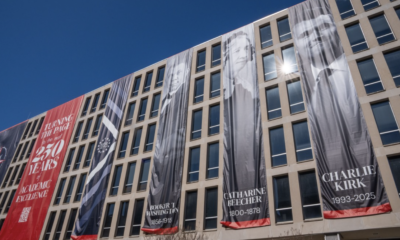Trump Presidency
Historic U.S.-Canada Library Cut in Two as Border Closure Sparks Outcry
A historic symbol of cross-border unity is at the centre of controversy after the United States blocked Canadian access to the US-Canada Haskell Free Library and Opera House. This unique building straddles the border between Stanstead, Quebec, and Derby Line, Vermont. The decision has prompted criticism from Canadian officials and residents who see the move as undermining a long-standing tradition of open, binational cooperation. Built deliberately to span the US-Canada border, the Haskell Free Library and Opera House has long served as a rare and tangible symbol of international friendship.
Visitors have marvelled at its layout: the library’s entrance is located in Vermont, while most of the collection and part of the building are situated in Quebec. Inside, a strip of tape marks the border — a line that divides not just nations, but sometimes performers from their audiences. In the upstairs opera house, artists often perform from Canadian territory while the audience watches from the US.
View this post on Instagram
For decades, Canadians could access the building through a sidewalk on the US side without going through formal customs, provided they exited the same way. That access has now been revoked. Under new regulations introduced by US Customs and Border Protection (CBP), all Canadian visitors must go through an official border crossing to enter the building, disrupting a longstanding arrangement that many in Stanstead and Derby Line cherished.
“This closure not only compromises Canadian visitors’ access to a historic symbol of cooperation and harmony between the two countries but also weakens the spirit of cross-border collaboration that defines this iconic location,”
The town of Stanstead stated in a statement.
Toronto’s Cherry Blossoms Near Peak Bloom: Where to See the City’s Most Stunning Spring Display
The US Department of Homeland Security defended the move, citing concerns about criminal activity. A spokesperson claimed that drug traffickers and smugglers were exploiting the relaxed border access. “We are ending such exploitation by criminals and protecting Americans,” the department said, though no current evidence of smuggling was provided.
The only known case involving the library dates back to 2018, when a Quebec man, Alexis Vlachos, was convicted of smuggling handguns into Canada via the library. He was sentenced to 51 months in prison.
Still, critics argue that the US response is heavy-handed. Residents and officials on both sides of the border point to the library as a symbol of trust, not a threat. A small group of demonstrators gathered outside the building on Friday to protest the new restrictions.
Peter Welch, a Democratic senator from Vermont, expressed concern over the closure. “Vermont loves Canada. This shared cultural institution celebrates a partnership between our two nations,” he said on X.
The Haskell Free Library, donated by a local family in the early 1900s, serves as a poignant reminder of a time when border crossings were marked more by handshakes than hard lines. For many, the new rules represent not just a loss of convenience but a fraying of a unique and historic bond.













































Pingback: Canada Freezes US Air Routes as Air Canada pivot to Europe